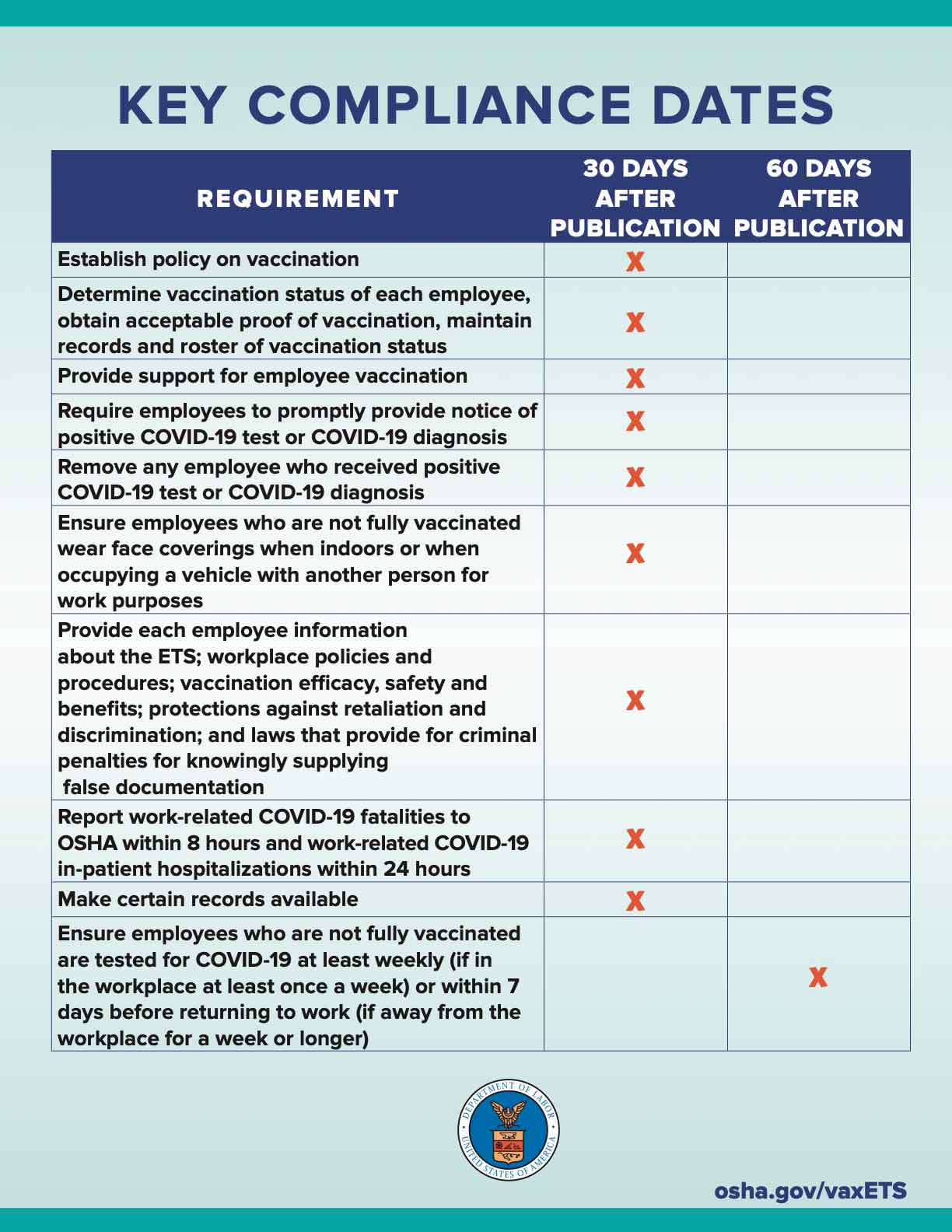This week’s vaccine wisdom (subject to change at any time).
Is my company required to mandate vaccinations for employees?
Possibly. Apart from the mandate for federal employees, there are three types of COVID vaccination mandates from the federal government that apply to employers.
Private sector employers of 100 or more employees may be covered by an Emergency Temporary Standard that was issued on November 5 by the Occupational Safety and Health Administration. The ETS requires covered employers to either require employees to be vaccinated (with limited exceptions), or to give employees the choice between being vaccinated or undergoing weekly testing for COVID-19. It also has requirements related to policy development, encouraging employees to be vaccinated, collecting and retaining proof of vaccination or negative COVID tests, and more (see OSHA’s “to-do” list, below). NOTE: As of November 6, the OSHA ETS has been stayed nationwide, which means that it cannot take effect for the time being.
Federal contractors may be covered by vaccination guidelines issued by the Safer Federal Workforce Task Force and Executive Order 14042, which was issued by President Biden on September 9. The contractor guidance currently requires all “covered contract employees” to be “fully vaccinated” by January 18, 2022. The only employees allowed to opt out of vaccination are those who need reasonable accommodations for medical conditions or religious beliefs. To be considered “fully vaccinated,” the employee must have had all required shots, followed by a two-week period after the last shot. That means the deadline for employees to get their final shot is really January 4, 2022. NOTE: As of November 30, the federal contractor guidance has been preliminarily enjoined in the states of Kentucky, Ohio, and Tennessee, but it is still in effect in all other states.
Health care employers who receive Medicare or Medicaid funds may be covered by a vaccine mandate issued by the Centers for Medicare & Medicaid Services. Like the federal contractor guidance, the CMS regulation does not give employees of covered employers the option to be unvaccinated unless they qualify for a medical or religious reasonable accommodation. NOTE: As a result of two court decisions issued this week, the CMS mandate was preliminarily enjoined nationwide and is not in effect until further notice.
All of the federal vaccine mandates allow reasonable accommodations to be made for medical conditions or religious beliefs.
Employers who are not covered by a federal vaccine mandate should check applicable state law before deciding how to proceed. Some states have imposed vaccine mandates, and other states — most notably, Florida and Texas — have enacted legislation outlawing most employer vaccine mandates. However, in most jurisdictions, employers who are not covered by a federal vaccine mandate are free to impose a strict vaccine mandate (with exceptions only for reasonable accommodation), a “soft” mandate that allows employees to opt out for any reason with regular testing and other precautions, or no mandate at all.
My company is covered by one of the federal vaccine mandates, but we have operations in a state that has outlawed vaccine mandates. What should we do?
If the applicable federal mandate has not been stayed or enjoined by a court, then the federal law would presumably take precedence over state law. But if your federal mandate is not in effect, then you would have to comply with the law in your state unless or until the courts issue a ruling upholding the federal mandate.
My company is covered by one of the federal mandates that was put on hold by the courts. Should we be doing anything while we wait for the courts to issue a final decision?
Yes! The best course seems to be to do everything you can to be ready, but without “going live.” For example, if you are covered by the OSHA ETS, review this “to-do” list from the OSHA website:

Before you start, you’ll need to decide whether to issue a strict mandate (vaccines required for everyone except in cases of medical or religious accommodation) or a “soft” mandate (employees can opt out of vaccination for any reason but must be tested weekly). Once you have made that decision, go ahead and prepare a vaccination policy, begin collecting proof of vaccination from your vaccinated employees, and develop your “pro-vaccination” materials for employees. If you have decided on a strict mandate, set and communicate a deadline for the unvaccinated employees to be vaccinated. Determine what action you will take with any unvaccinated employees who do not meet the deadline.
If you have decided on a “soft” mandate, estimate the number of employees you believe will remain unvaccinated and begin shopping for a vendor who can conduct the weekly testing and, perhaps, handle your weekly testing recordkeeping obligations. But don’t sign any contracts until you know that the mandate will be taking effect. And, for employee relations reasons, wait for a court decision before telling your unvaccinated employees that they will have to be tested for COVID on a weekly basis — unless you planned to require that regardless of any federal mandate.
(If you are covered by the federal contractor or CMS mandates, you won’t have the option of a “soft” mandate, and the task list will not be identical to the OSHA ETS list.)
Are we having fun yet?


